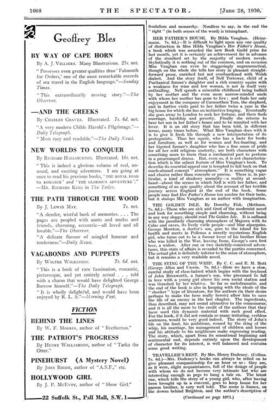HER FATHER'S HOUSE. By Hilda Vaughan. (Heine- mann. 7s. 6d.)—It
is difficult to light upon any one quality of distinction in Miss Hilda Vaughan's Her Father's House, a book which was awarded the new Book Guild prize for last month, yet it is certainly an achievement far in advance of the standard set by the majority of modern novels. Stylistically it is nothing out of the common, and on occasion Miss Vaughan can even be staggeringly ungrammatical, though on the whole she tells her story in pleasant straight- forward prose, enriched but not overburdened with Welsh dialect. And the story itself, of Nell Tretower, child of a Puritanical farmer's daughter and a rich country squire with a weakness for wine and low women, is not in itself very enthralling. Nell spends a miserable childhood being bullied by her mother and the even more narrow-minded uncle with whom her mother has gone to live ; and finds her only enjoyment in the company of Carmarthen Tom, the shepherd, and in furtive visits paid to her father twice a year in the big house for which she has an instinctive longing. "Eventually she goes away to London to seek her fortune, and there finds marriage, hardship and poverty. Finally she returns to bear her son in her father's house and to be reunited with her lover. It is an old story that has been told, in different terms, many times before. What Miss Vaughan does with it is to give it fresh life through a new interpretation of its protagonists. Thus her squire, who has a taste for books and furniture, as well as for women and fox-hunting, and her bigoted farmer's daughter who has a fine sense of pride for all her cold religious austerity, are both characters with something more to them than a mechanical part to perform in a prearranged drama. But, even so, it is not characteriza- tion which is the salient feature of Miss Vaughan's book. To describe its essential appeal one is tempted to fall back on that much-abused concept atmosphere." It is something vague and elusive rather than concrete or precise. There is, in par- ticular, a kind of shadowy unreality—a reality at second- hand—about the scenes in which Nell is with her father, and something of an epic quality about the account of her terrible journey across England at the end of the book. Some people may find Her Father's House too sombre for their taste, but it stamps Miss Vaughan as an author with imagination.


















































 Previous page
Previous page